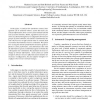Free Online Productivity Tools
i2Speak
i2Symbol
i2OCR
iTex2Img
iWeb2Print
iWeb2Shot
i2Type
iPdf2Split
iPdf2Merge
i2Bopomofo
i2Arabic
i2Style
i2Image
i2PDF
iLatex2Rtf
Sci2ools
108
Voted
SASO
2008
IEEE
2008
IEEE
Autonomic Resource Management through Self-Organising Agent Communities
In this paper, we analyse how autonomic resource management can be achieved within a system that lacks centralized information about current system demand and the state of system elements. Rather, regulation of service provision is achieved through local co-adaptation between two groups of system elements, one tasked to autonomously decide which services to offer and the other to consume them in a manner that minimises resource contention. We explore how varying the amount of information stored by agents influences system performance, and demonstrate that when the information capacity of individual agents is limited they self-organise into communities that facilitate the local exchange of relevant information. Such systems are stable enough to allocate resources efficiently and to minimise unnecessary reconfiguration, but also adaptive enough to reconfigure when resource demand changes.
Autonomic Resource Management | Resource | Resource Demand Changes | SASO 2008 | Self-Organizing Systems |
Related Content
| Added | 01 Jun 2010 |
| Updated | 01 Jun 2010 |
| Type | Conference |
| Year | 2008 |
| Where | SASO |
| Authors | Mariusz Jacyno, Seth Bullock, Terry R. Payne, Nick Geard, Michael Luck |
Comments (0)

